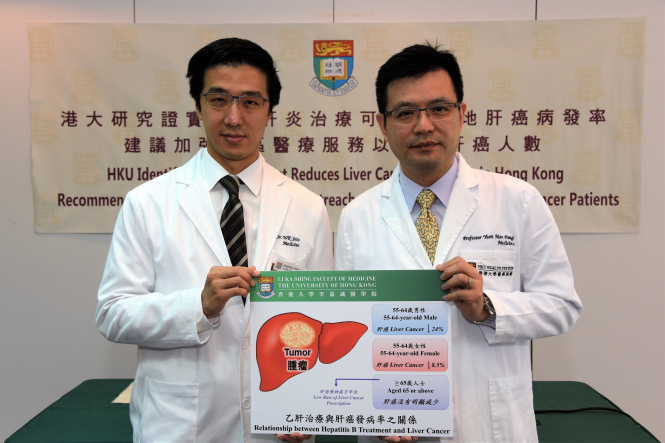Media
HKU Identifies HBV Treatment Reduces Liver Cancer Incidence in Hong Kong Recommends Strengthening Community Outreach to Reduce Number of Liver Cancer Patients
14 Sep 2017

(From left) Dr Walter Seto Wai-kay, Clinical Associate Professor and Professor Richard Yuen Man-fung, Li Shu Fan Medical Foundation Professor in Medicine, Chair Professor of Gastroenterology and Hepatology, Department of Medicine, Li Ka Shing Faculty of Medicine, HKU took a group photo at the press conference.
There are approximately 560,000 patients infected with hepatitis B virus (HBV) in Hong Kong. Due to its asymptomatic nature, around 25% hepatitis B cases may further develop into cirrhosis and/or liver cancer if no regular check-up and early treatment are available. Over 1,500 patients die of liver cancer every year in Hong Kong, and around 80% of the death cases are related to HBV. The research team of Department of Medicine, Li Ka Shing Faculty of Medicine, The University of Hong Kong (HKU), obtained 14-year HBV treatment data in specialist out-patient clinics from the Hospital Authority and statistically studied the effect of HBV treatment on liver cancer trends and confirmed that HBV treatment is associated with a reduction in overall liver cancer incidence. The team also studied the effect of treatment in specific age groups.
Hepatitis B virus and liver cancer
Hepatitis B is a common infectious disease caused by hepatitis B virus (HBV). Hepatitis B can be transmitted through blood and body fluids, for example through transfusion of contaminated blood, sharing contaminated needles and sexual contact. The incubation period of HBV ranges from 45-160 days. Patients who are infected with HBV will become chronic carriers if there is no early detection of the virus. As most HBV carriers are asymptomatic, most patients are not diagnosed until hepatitis B develops into cirrhosis and liver cancer, with symptoms like jaundice, swollen lower limbs and stomach, and loss of appetite and weight. Approximately 8% of the Hong Kong population are infected with HBV.
Around 80% of liver cancer patients are HBV carriers. Liver cancer is currently the 4th most common cancer in Hong Kong. It is a deadly cancer, its mortality rates are ranked 2nd in male and 4th in female. 1,585 patients die of liver cancer in Hong Kong in 2014.
Generally speaking, Hepatitis B can be monitored through regular check-up if the level of activity of HBV is low. If the HBV level of activity is high and elevated liver enzymes occur, HBV treatment may be considered.
Research method
The HKU research team obtained data of 14-year (from 1999 to 2012) HBV treatment trends in specialist out-patient clinics from the Hospital Authority, and statistically studied the effect of HBV treatment on liver cancer trends from 1990 to 2012. The team also studied the effect of treatment in specific age groups.
Research findings
Based on treatment patterns from 1999 to 2012 from the Hospital Authority, the research team finds that HBV treatment is associated with a reduction in overall liver cancer incidence, and the effect is the most obvious among the age group of 55-64 years. The liver cancer incidence is reduced by 24% among men who received HBV treatment in the age group of 55-64 years and reduced by 8.5% among women who received HBV treatment in the same age group. This could be explained by a high treatment prescription rate and high clinic attendance rate among this age group.
The preventive effect of HBV treatment in the elderly age group (≥65 years) is diminished. This might be because drug prescription rates and clinic attendance rates among the elderly population are lower.
Significance of the study and suggestions
The HKU study confirms the effectiveness of HBV treatment in reducing the burden of liver cancer. HKU encourages HBV-infected patients to receive long-term follow-up and receive treatment when necessary.
Given the low rates of clinic attendance and treatment prescription among the elderly population, community outreach to elderly HBV-infected individuals should be strengthened in order to further reduce liver cancer incidence rates in Hong Kong.
“The HKU study confirms that HBV treatment can reduce liver cancer incidence rate. Through strengthened community outreach, there will be a better control in liver cancer incidence in Hong Kong,” says Professor Richard Yuen Man-fung, Li Shu Fan Medical Foundation Professor in Medicine, Chair Professor of Gastroenterology and Hepatology of Department of Medicine, Li Ka Shing Faculty of Medicine, HKU.
About the Research team
Professor Richard Yuen Man-fung, Li Shu Fan Medical Foundation Professor in Medicine, Chair Professor of Gastroenterology and Hepatology of Department of Medicine, and Dr Walter Seto Wai-kay, Clinical Associate Professor of Department of Medicine, Li Ka Shing Faculty of Medicine, HKU have been conducting HBV and liver research for many years. A number of observational and interventional research projects are currently in progress, which will eventually provide more research insights and be of benefit to the Hong Kong community.
Media enquiries
Please contact Li Ka Shing Faculty of Medicine of The University of Hong Kong by email ([email protected]).
Please visit the website at http://www.med.hku.hk/news/ for press photos and presentation slides.
Professor Richard Yuen Man-fung, Li Shu Fan Medical Foundation Professor in Medicine, Chair Professor of Gastroenterology and Hepatology, Department of Medicine, Li Ka Shing Faculty of Medicine, HKU points out that hepatitis B virus treatment is associated with a reduction in overall liver cancer incidence, and the effect is the most obvious among the age group of 55-64 years.
Dr Walter Seto Wai-kay, Clinical Associate Professor, Department of Medicine, Li Ka Shing Faculty of Medicine, HKU suggests that community outreach to elderly HBV-infected individuals should be strengthened and HBV-infected patients should receive long-term follow-up in order to further reduce liver cancer incidence rates in Hong Kong.


